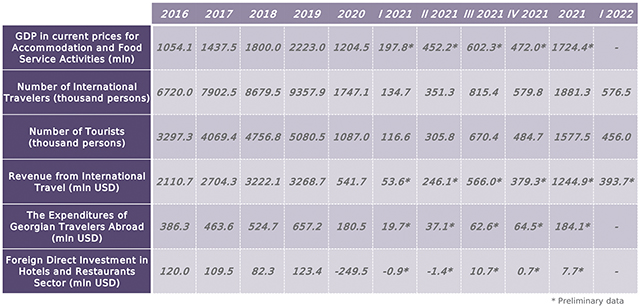The number of international travelers increased by 266.3% in March 2022, compared to the same period of 2021, and declined by 65.9% compared to the same period in 2019. Meanwhile, the number of international visitors increased by 236.9% (2022/2021) and declined by 62.9% (2022/2019), and the number of international tourists increased by 210.6% (2022/2021) and declined by 51.5% (2022/2019).
In March 2022, the top countries of origin of international visits were Turkey (42,421 visits), Russia (22,536 visits), and Armenia (21,990 visits). For each of these countries, the recovery in number of visits was most significant for Armenia (56.4% of the March 2019 figure), followed by Turkey (48%) and Russia (22.9%).
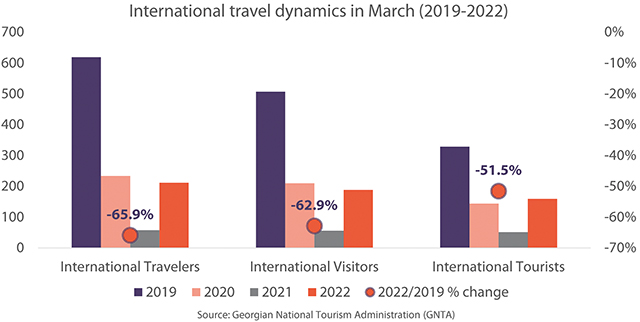
ENTRIES BY RUSSIANS, BELARUSIANS, AND UKRAINIANS
Since the Russian invasion of Ukraine on 24 February 2022, and the consequent imposition of sanctions on Russia and Belarus, a rapid inflow of international travelers into Georgia from Russia, Belarus, and Ukraine has been evident.
According to data collected by the Ministry of Internal Affairs, in March 2022, the number of Russian citizens to enter Georgia reached 45,100, which amounted to 18% of total entries into Georgia. Moreover, compared to the previous month, the number of entries by Russian citizens increased by 68.8%.
Meanwhile, entries by Belarusian citizens saw a dramatic 281.1% month-on-month increase, reaching 20 000 and amounting to 8% of total entries into Georgia. The entries by Ukrainian citizens increased by 53.5% compared to February 2022 and reached 16,900, accounting for 6.8% of total entries. However, the provided data does not cover how many citizens of given countries have crossed the border to leave the country (transit).
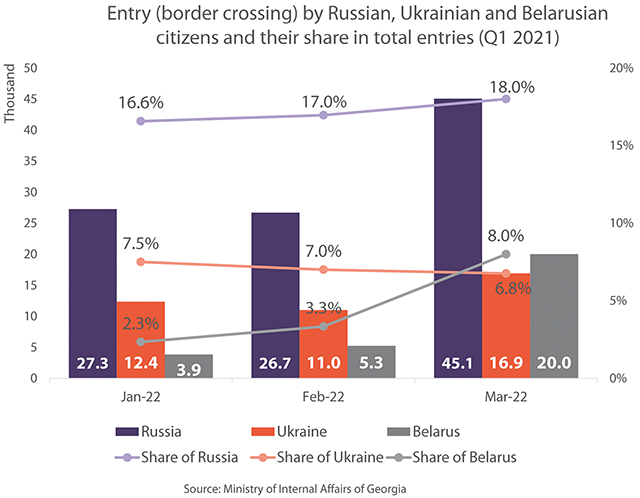
EXITS BY RUSSIANS, BELARUSIANS, AND UKRAINIANS
For further analysis, the number of exits by international visitors for the first quarter of 2021 should also be taken into consideration, as the statistics from the National Statistics Office of Georgia are counted as international visitors leaving the country. From the beginning of 2021, the number of exits by Russians, Ukrainians and Belarusians showed significant recovery. In January 2021, the exits by Russians reached 33% the January 2019 figure, while for both Ukrainians and Belarusians this figure was equal to 60%.
However, in March 2022 the number of exits by Belarusians reached 5300 (86% higher than March 2019), while the number of exits by Ukrainians reached 6400 (51% lower than March 2019). Meanwhile, the number of exits by Russians reached 22,500 (77% lower than March 2019). An observation of the monthly dynamics revealed that the exits by Ukrainians in March 2022 declined significantly by 26%, compared to February 2022. Meanwhile, the corresponding figure for Belarus increased by 53%, and there was an 8% rise for Russia.
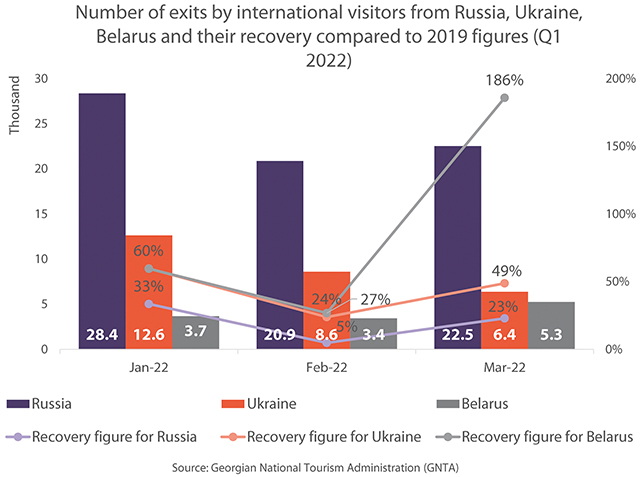
TRAVEL RECEIPTS FROM RUSSIANS, BELARUSIANS, AND UKRAINIANS
Another indicator which can be used to measure the inflow from the selected countries is the travel receipts from Russians, Belarusians and Ukrainians.
In March 2022, travel receipts from Russians showed a significant increase (133%) compared to the previous month, reaching $34.3 mln. For Belarusians, the increase was even higher (551%), with income from receipts reaching $29.3 mln. The share of travel receipts from Russians (+6 pp) and Belarusians (+13 pp) also showed a significant month-on-month increase. In total, citizens of these two countries accounted for 37% of total travel receipts. Meanwhile, despite the increased receipts (by 40%) from Ukrainians, the share of Ukrainians in total travel receipts declined to 8%.
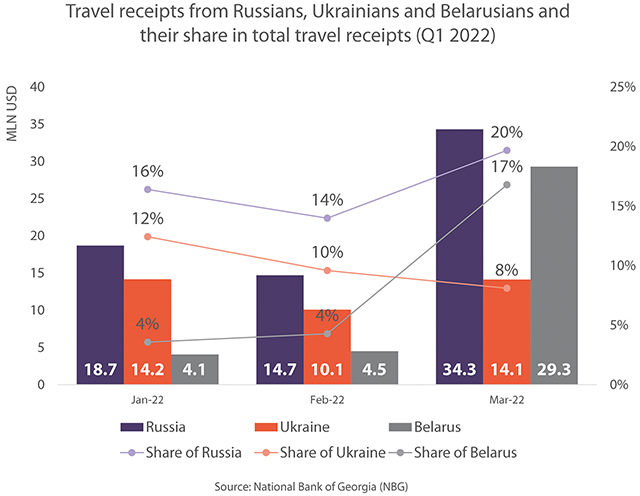
DIFFERENCES IN EXITS AND ENTRIES
After the beginning of the war in Ukraine, the border crossing statistics have revealed significant differences in the number of entries and exits by Russians, Belarusians, and Ukrainians.
Conceding that there may be some possible statistical discrepancies, the number of entries into Georgia in March 2022 from the selected countries was considerably higher compared to the exits in the same month. The difference is especially high for Russia, followed by Belarus and Ukraine. It should also be noted that March 2022 was the only month in Q1 2022 where such substantial differences could be observed. Complementing this trend, the receipts from international travelers have risen, with significant monthly rises for Belarus and Russia, followed by Ukraine.
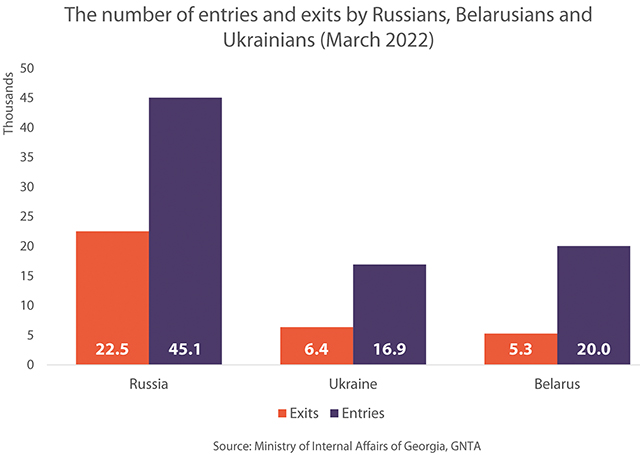
Hotel Price Index in Georgia
In March 2022, in Georgia the hotel price index increased by 8.5% compared to February 2022. The 3-star, 4-star and 5-star hotel price index increased by 7.5%, while for guesthouses, the price index increased by 4.0%. The monthly price increase was most prominent in Tbilisi (14.6%). Meanwhile, in Mtsketa-Mtianeti prices has shown the most significant decline (-12.6%).
In March 2022, compared to March 2021, hotel prices in Georgia increased by 14.9%. The prices of 3*, 4*, 5* hotels increased by 16.6% and the prices of guesthouses increased by 19.0%. The yearly price increase was the highest in Adjara (25.8%). While. the yearly decline was only noticed in Samegrelo-Zemo Svaneti (-3.4%).
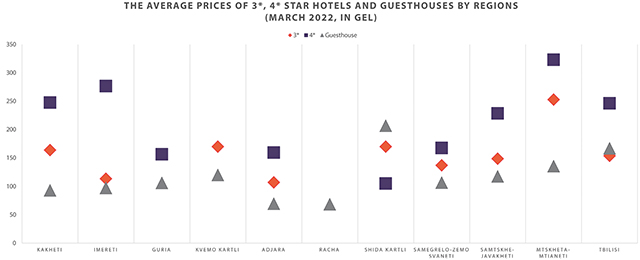
Average Hotel Prices in Georgia (March 2022)
In Georgia, the average cost of a room in a 3-star hotel was 152 GEL per night in March 2022, while the average cost of a room in a 4-star hotel in Georgia was 246 GEL per night and the average cost of a room in a guesthouse was 114 GEL per night.
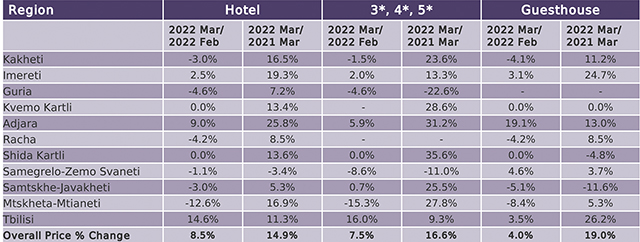
The average cost of a room in a 5-star hotel in Georgia in March 2022 was 406 GEL per night. In Tbilisi, the average price was 574 GEL, followed by Kakheti 451 GEL, Samtskhe-Javakheti 373 GEL and Guria 352 GEL.
